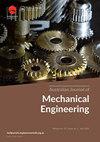Exergoeconomic analysis of an integrated electric power generation system based on biomass energy and Organic Rankine cycle
IF 1.3
Q3 ENGINEERING, MECHANICAL
Australian Journal of Mechanical Engineering
Pub Date : 2023-10-11
DOI:10.1080/14484846.2023.2252641
引用次数: 0
Abstract
ABSTRACTThe present study investigates the thermodynamics analysis of a trigeneration system using a gasifier system. An Organic Rankine Cycle (ORC) system is used to heat recovery and consequently, supplying the cooling demand. The first and second laws of thermodynamics are used to energy and exergy analysis of the system. Some thermodynamic parameters which affect the system performance including combustion temperature, gasifier temperature, compressor isentropic efficiency, gas turbine isentropic efficiency, compressor pressure ratio, and ORC pressure are parametrically analysed and their contribution in improving the efficiency and economy of the system is investigated. To the sustainable performance of the combined system, we need an evolutionary algorithm to identify the optimum values of thermodynamic parameters that have an impact on system performance. Hence, the Multi-Objective Particle Swarm Optimization (MOPSO) algorithm is used to find the best values of decision variables. The most striking result to emerge from the optimisation.optimisation is that implementing the MOPSO algorithm improves the exergy efficiency by 5.17% and reduces the total cost of the system by 1.9%.KEYWORDS: Gasifierbiomass energyOrganic Rankine cycleMOPSO algorithmexergoeconomic analysis Disclosure statementNo potential conflict of interest was reported by the author(s).Data availability statementThe datasets generated during and/or analysed during the current study are available from the corresponding author on reasonable request.Additional informationNotes on contributorsEhsan AzishEhsan Azish is a PhD student in Mechanical Engineering, specializing in Energy Conversion at Dezful Azad University.Ehsanolah AssarehEhsanolah Assareh Assistant Professor (PhD) at YU University (South Korea) and IAUD University (Iran), specializing in Renewable Energy.Behzad AzizimehrBehzad Azizimehr is a PhD student in Mechanical Engineering, specializing in Energy Conversion, and he works as an engineer and supervisor for Solar Energy Systems at Gamma Energy Company.Moonyong LeeMoonyong Lee is a Professor in the School of Chemical Engineering at Yeungnam University, specializing in Process optimization.基于生物质能和有机朗肯循环的一体化发电系统的努力经济性分析
摘要本文研究了气化炉三联产系统的热力学分析。有机朗肯循环(ORC)系统用于热回收,从而满足冷却需求。热力学第一和第二定律用于系统的能量和火用分析。对燃烧温度、气化炉温度、压缩机等熵效率、燃气轮机等熵效率、压缩机压比、ORC压力等影响系统性能的热力学参数进行了参数化分析,探讨了这些参数对提高系统效率和经济性的贡献。为了保证组合系统的可持续性能,我们需要一种进化算法来识别影响系统性能的热力学参数的最优值。为此,采用多目标粒子群优化算法寻找决策变量的最优值。最引人注目的结果从优化中出现。优化结果表明,采用MOPSO算法后,系统的火用效率提高了5.17%,总成本降低了1.9%。关键词:气化气、生物质能源、有机朗肯循环、clemopso算法、经济学分析披露声明作者未报告潜在利益冲突。数据可用性声明当前研究期间生成和/或分析的数据集可根据通讯作者的合理要求提供。本文作者是Dezful Azad大学机械工程专业的博士生,专攻能量转换。Ehsanolah Assareh,韩国YU大学和伊朗IAUD大学助理教授(博士),主要研究方向为可再生能源。Behzad Azizimehr是机械工程专业的博士生,专攻能量转换,他是伽马能源公司太阳能系统的工程师和主管。Moonyong Lee是岭南大学化学工程学院教授,专攻工艺优化。
本文章由计算机程序翻译,如有差异,请以英文原文为准。
求助全文
约1分钟内获得全文
求助全文
来源期刊

Australian Journal of Mechanical Engineering
ENGINEERING, MECHANICAL-
CiteScore
3.70
自引率
7.10%
发文量
77
 求助内容:
求助内容: 应助结果提醒方式:
应助结果提醒方式:


